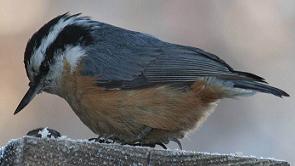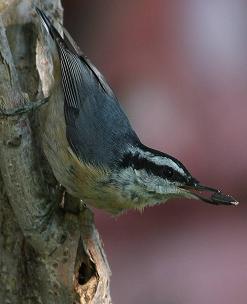Red-breasted
Nuthatch
Nuthatches will come to
feeders with suet and sunflower seeds.
Identification and Pictures
(Sitta Canadensis)
Red-breasted nuthatches are very energetic,
compact little birds about 4 1/2 to 4 3/4 inches long with stubby
tails, thick necks, and long pointed bills. Like all
nuthatches they are
very agile, and you will often see them hopping down a tree
trunk headfirst. A distinguishing feature is the broad
black line through the eye, with a white line over it.
They have a black cap, blue gray back, and wings, and are rusty
below. Females, and young are less colorful then
males. They have strong legs, and feet enabling them to
climb up and down tree trunks.
 They
get the name Nuthatch from wedging nuts into bark crevices to
hack at them with their strong bill. They
get the name Nuthatch from wedging nuts into bark crevices to
hack at them with their strong bill.
Photos by Keith Lee. The camera I use is
the Canon
EOS 40D. Visit All-birds store
Three other similar nuthatches are the White-breasted,
Brown-headed, and Pigmy nuthatches.
Nuthatch Songs and Calls
Their call of ank ank, is higher and more
nasal than that of White-breasted nuthatches. As a pair moves around together they will make soft
calls to each other. Their song is a high-pitched
wa-wa-wa. Recent studies by Christopher Templeton at the University of Washington show that nuthatches understand the warning calls of
chickadees.
Chickadees use different alarm calls to signal the type, and
size of predators, and to get other small birds to help in mobbing
a predator to chase it away. Listen to Sound
Range and Habitat
They can be found in parts of Canada in
summer, and year round in the northwest, north, and northeast
U.S. Their winter range is through out the U.S.
They inhabit both coniferous and deciduous forests but prefer
coniferous. They will usually be in pairs, but may be in mixed
flocks.
Breeding and Nesting
Breeding season begins in late April or May. Red-breasted nuthatches are monogamous. The male will sing from a perch.
When a female approaches he will lift his head and tail, and
sway from side to side with drooping wings.
The nest will be in cavity excavated by both birds, usually in
an old stump or dead tree. They
will smear pitch around the entrance to deter insects, mammals,
and other birds. A piece of bark is often used to
spread the pitch. They will fly straight into the hole
to avoid the pitch. The female lines the inside of the nest
with grass, bark fibers, moss, needles, feathers, and hair.
They sometimes use birdhouses, and old woodpecker holes.
 The female will incubate
4 to 8 white, cream
or pinkish eggs, spotted with light red, reddish-brown or
purplish spots. The male will feed her while she incubates
the eggs for around 2 weeks. Both parents will feed the
young birds for 18 to 21 days while they are in the nest, and
for another 2 weeks after they fledge. They normally only have one brood. The female will incubate
4 to 8 white, cream
or pinkish eggs, spotted with light red, reddish-brown or
purplish spots. The male will feed her while she incubates
the eggs for around 2 weeks. Both parents will feed the
young birds for 18 to 21 days while they are in the nest, and
for another 2 weeks after they fledge. They normally only have one brood.
Food and Feeding
Natural foods are insects such as beetles, and
caterpillars. They also like nuts, and seeds from pinecones.
Just like White-breasted nuthatches they will work their way
down a tree trunk. They will also fly out to catch
insects out of the air. Nuthatches will store
food in bark crevices, and small holes in trees for winter use.
They will come to your yard with suet, and feeders with
sunflower seeds, and nuts.
Nuthatches can be fairly tame, and may even
take food from your hand. There are even reports that
some nuthatches will follow a person they are used to around
until they get food from them.
Hand Feeding
Nuthatches to eat from your hand. Let
them get used to you by a feeder, then hold out your hand with
sunflower seeds in it.
View video of nuthatches
eating from hand.
For more on food
and feeding click here.
For more on feeders click here.
To learn about other favorite
birds click here.
 
|
